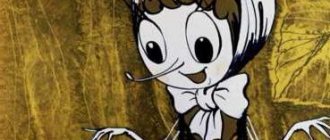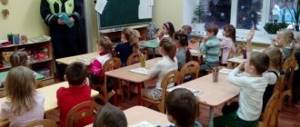Economic fairy tales for children of senior preschool age
Olga Tsypysheva
Economic fairy tales for children of senior preschool age
" Economic fairy tales " for children of senior preschool age .
Fairy tale
"Budget Keepers"
Once upon a time there was a Wallet. He loved it when they carefully opened it, taking out banknotes. He kept them in his different pockets. Large bills were kept in a special section and kept under lock and key. They were used to purchase large items, groceries, toys, purchase furniture, pay rent, electricity, gas. Those of lesser value were in a different section. They were used to buy travel tickets, newspapers, pies and other small items. Most often the wallet was not very thick. But there were special days when the bills filled him so much that he was afraid that his buttons and clasps would not hold up and his skin would burst. How he loved such moments! On such days it was often opened. But there were also sad days. Then it seemed that the owner had forgotten about him, because he was almost empty inside. And he was transferred from one place to another.
One day, a beautiful, bright, shiny Card appeared next to the Wallet. The wallet became wary:
“Hello,” he said . - I am Wallet. I am the custodian of the family budget.
- And I am a plastic card. Now I will be the custodian of the family's funds.
- But where do you keep the bills?
“They are in me,” Card answered proudly.
“But you are so thin and small,” the Wallet was amazed, “and you have no pockets at all.” Where are they located?
I’m not interested in this topic: “The product was purchased or the service was found Violates the law or spam Interferes with viewing the content Thank you, the ad is hidden.”
“I don’t need pockets,” Card smiled mysteriously. “I keep the secret of magic numbers that only the owner knows.” Using them, he can buy everything he needs and even put some bills in your pocket.
“So they won’t forget about me”
, thought the Wallet and was very happy. And then he enthusiastically suggested to Card:
- Let me take care of you. I have a lot of pockets, and among them there is a safe place for you. And you will remain so beautiful and bright for a long time.
The card wanted to refuse, but, after thinking, it got into the pocket of the Wallet. The wallet thought: “Now the owner will never forget about me, and the Card will be in order.”
.And the Card thought:
“How warm and cozy it is in the pocket of the Wallet and he will always have fun
.
And then they realized how good it is when someone needs you.
Fairy tale
"The Story of a River"
This happened in those days when the gods ruled the world. In one ancient city there lived a man named Nile. He was a very greedy, rich and important gentleman who believed that everything that nature gives belongs only to him, and only he can dispose of it as he pleases.
At this time, nature was truly amazing and extraordinary. Unprecedented animals and birds lived in the forests, and there were a lot of fish in the rivers; Everything around was fragrant with bright colors. There was a legend that a miracle river flows far from this city. It is so clean and transparent that all the fish that live there are visible from the shores.
The greedy Neil found out about this. He gathered his servants and went in search of this miracle river.
I saw the Nile River and couldn’t believe my eyes: it was wide, crystal clear, and there were no visible fish in it. Then he ordered his servants to catch everything that was in this river, and the servants set to work. They fished for a day, two, three until they caught everything that was there.
Nile became even richer and greedier. Now I wanted to drain this river. He ordered his servants to dig the deepest well in the world and transfer all the water from it to his well.
That's what the servants did. For a long time they carried water from this miracle river until they completely drained it. Nile became the richest in his city, since water in those days was worth its weight in gold.
The gods found out about this, became angry and summoned the Nile to them.
- Why did you catch all the fish? - asked Neptune.
- Why did you drain the river? - Zeus asked. -Who gave you the right to destroy what nature has created?
But Neil had nothing to answer the gods. And then they decided that he could atone for his guilt only if he returned everything to normal. Neil was unable to accomplish this, despite his wealth and power. Then the gods punished the greedy master and turned him into a long and wide river. And this spell will disappear only when people have exhausted all the water from this river.
After this, people decided that this should not happen again on Earth. They will always save water and use it only for its intended purpose. They will try to ensure that the rivers never disappear from the face of the Earth and that people like the Nile never return to us.
Since then, that river has flowed and every year it becomes deeper, more beautiful and wider.
Fairy tale
"Household"
.
The kids decided to help mother Goat with the housework: cook dinner, clean up the mess. They thought that the soup would be delicious if it was made from cabbage, potatoes, apples and nuts. “Put everything in a saucepan at once, add water, and put it on the stove.”
, says one kid.
“The carpet will be clean if you run, tumble, and jump on it
,
expresses his point of view.
Mama Goat was not happy when she saw the “help”
their kids.
She said : “You need to know the secrets of housekeeping
.
The kids diligently learned the secrets of home craftsmanship. And when Mother Goat left on business, the kids agreed on what work each of them would do. "I'll cook a delicious lunch"
, says one kid. “I will repair the vacuum cleaner and quickly
I’ll put things in order,” says another. And the third decides to work in the garden, watering his favorite cabbage.
Mama Goat decided to create her own business. She was a master of sewing and sewed pants, shirts for little kids and other animals. A batch of new clothes was ready, but did not go on sale. "Why?"
- the kids were surprised.
“A product cannot be sold without a label (label)
“- explains Koza. — The label indicates the name of the product, size, manufacturer, price. The kids happily began making these necessary labels.
Fairy tale
"Forest Cafe"
.
Once upon a time there lived a Little Mouse in a beautiful little house with many rooms.
The mouse occupied one room, and rented out the others to forest dwellers and received money for it. “How to spend the money received: buy yourself a new fur coat, or invest in the construction of an ice cream cafe? - the Mouse reflects, - there is not a single cafe in the forest. And its residents love ice cream and will be happy to buy it.” And Mouse firmly decided to build an ice cream cafe.
One day Little Mouse invited her friends to a forest cafe. Hedgehog who
stood behind the bar, offered visitors a menu indicating different drinks (juices, cocktails, etc.)
and prices. The friends chose their favorite drinks, and the hedgehog quickly prepared them.
The animals really liked how their orders were fulfilled, and they promised that they would often come to this cafe.
Fairy tale
"Golden Egg"
.
Once upon a time there lived a grandfather and a woman. And they had a chicken, Ryaba. The Hen laid an egg, and not just any egg, but a real Faberge egg. Oh, how beautiful! It glitters and shimmers with lights. Grandfather and grandmother, like little children, rejoice, look at him all day long, and cannot stop admiring him.
Their granddaughter came to visit them from the city. They began to keep advice on how to save an egg.
“You, granddaughter, are smart,” said the grandfather , “you study at the institute, help us old people , advise how to preserve the family property.” Last time we disgraced ourselves, we didn’t notice, and the golden egg broke. All my hope is in you, honey.
- Oh, grandpa and grandma, this is not an easy matter, economic security is important
answered the granddaughter, “it’s not simple.” To begin with, to prevent the Mouse from breaking the egg again, you need to
buy mousetraps and place them everywhere.
“What are you talking about, granddaughter?” the woman timidly objected . - Why are you doing this to our Mouse?
do you offend? She’s good and didn’t break an egg on purpose. He's been living in our house for a long time,
helps me and my grandfather. Works as a taster.
– Maybe we’ll put Murka to guard the egg? - asked the grandfather.
- Murka? – the granddaughter laughed. - So this is Myshka’s best friend! And she got fat from Whiskas
so that he can barely move.
“Then let the Bug guard the egg,” the grandfather did not calm down.
- Oh, I can’t! Bug! This tiny lap dog! You better be careful that the mice don’t drag her away! With her pedigree, only catching mice! All the neighbors will laugh at us!
- So what should we do, granddaughter? Help me,” the grandfather begged.
- Okay, if you don’t want to set mousetraps, don’t! There is a more reliable method. Place the egg in a safe deposit box. Just recently a new bank opened in our area.
They did as they decided. Grandfather and woman sold turnips. We used this money to withdraw money from a safe deposit box in the bank. Such a strong cell, good quality. We checked it thoroughly. Baba beat and beat, but she didn’t break it. Grandfather beat and beat, but did not break. And the computer mouse ran, waved its tail, and all the money from the bank disappeared. And after them, the bank itself disappeared along with the cell. As if it never happened.
The grandfather is crying, the woman is crying, and the granddaughter is crying the most:
- Oh, what a disaster! And what have I, stupid, done! With my own hands I gave away a family heirloom to thieves.
Ryaba the Hen came running and said:
- Don't cry, grandfather, don't cry, woman. The Chinese fake has disappeared. But Mouse and I replaced the real egg a long time ago. My heart felt something was wrong.
Then the Mouse came out of its hole and brought an egg. Everyone was happy, having fun, thanking Mouse and Ryaba. And the granddaughter felt so ashamed that she didn’t trust the Mouse.
Grandfather and woman sold an egg. We bought ourselves a farm with this money. Become
It's fun to live and grow huge turnips.
Fairy tale
"Golden turnip"
.
Grandfather Potap lived in a certain kingdom, in a certain state. Potap had everything: a house and a car, but one day his grandfather decided to increase his capital. He decided to plant a turnip, but not a simple one, but a golden one. A businessman he knew told him about this turnip. And for this my grandfather needed to take out a loan; there wasn’t enough money.
Only there is not enough capital (he says to the banker, give me a loan worth a hundred thousand. I will increase my wealth!
The bank approved the loan. Good reputation! (banker gives money)
.
Grandfather planted turnips
He tried his best
The turnip has grown amazingly!
Golden and beautiful!
It's time to pull out the turnip! (trying to pull)
Oops, something is too heavy! Looks like a lot of gold! One can't do it alone. I need to call grandma.
What, grandfather, can’t you handle alone? Give me 50%, then I’ll help, I’m not greedy! Are you old ? I'm trying for you all ! (looked at the grandmother and the turnip, scratched the back of his head)
.
Okay, I'll give you 25% for your help and no more. said everything !
Well, I agree with that! So they began to pull the turnip: grandfather for the turnip, grandmother for grandfather,
they pull - they pull, they can’t pull!
Hey, old man , you and I can’t get it out! Let's call our granddaughter. The grandfather thought and agreed. Hey, granddaughter, Nastenka, come to us! The granddaughter looks at the grandmother, grandfather and turnip, well, grandfather, you can’t cope, then give me 50% and I’ll help! Well, in general, grandma asks, and you go there too. 25% and no more. Okay, 5% more, 5% less. I agree! They began to pull the turnip: the grandfather for the turnip, the grandmother for the grandfather, the granddaughter for the grandmother, they pulled and pulled, but they could not pull it out.
Then a dog appears - Zhuchka, and a cat - Murzik. They began to pull the turnip: grandfather for the turnip, grandmother for the grandfather, granddaughter for the grandmother, Zhuchka for the granddaughter, Murzik for the Zhuchka and almost pulled it out.
Here comes a mouse!
Yes, here, we need to help pull out the turnip, we can’t cope (points to the turnip)
(looking at the turnip)
. Wow! Pure gold! Drive the grandfather to 70%, otherwise I won’t help and parted ways.
Grandfather scratched the back of his head, there was nothing to do and agreed. Without thinking twice, the mouse made a hole in the ground and pushed the turnip out.
Grandfather divided the gold equally among everyone. The moral of this tale is : He is not strong who
big, and the one who is smart, and without work you can’t achieve anything in life!
Fairy tale
"Vaska the cat and Barbos the dog"
Once upon a time there lived a cat Vaska and a dog Barbos. They were wandering artists: the cat
Vaska sang, and the dog Barbos played the pipe, and thereby earned their living. Yes and
They wandered around the world, looking for happiness.
One day they were walking along the road and found a wallet. What to do? There's no one around
who lost is unknown. It’s scary to take it, and it’s a pity to leave it. It's not every time you get lucky like this! So they decided to divide the money equally. We reached a stone where the road diverged into two: one led to the left, the other to the right. “You, Barbos, as you know, but I want to build a house for myself. I’m tired of wandering around and singing your stupid songs!” - said the cat Vaska . "Goodbye"
- and went left.
“Goodbye, maybe we’ll meet again someday!”
“Don’t remember it dashingly,” Barbos answered and turned to the right.
He walked along the road, passed a mill, a meadow and saw the gray city gates ahead. And everything in this city was gray: gray houses, gray and sad faces of the people. Why is this?
And the dog realized that it was because they were bored. He decided to build a carousel in the city, and spent all his money on it. Barbos painted the carousels with bright, cheerful colors, then made a lot of multi-colored tickets. His pipe played loudly, inviting passers-by to ride the carousel. People flocked in droves. The street was filled with laughter and enthusiastic screams of children . They were all glad and happy. Residents repainted their houses in all the colors of the rainbow, and the city became beautiful and welcoming. And the dog Barbos himself was the most happy. He sold tickets for a whole month, and people kept coming and coming. It turned out to be a profitable business. His wallet got fatter and fatter. But soon Barbos got tired of sitting in one place, and he set off again.
He walked for a long time, got hungry and went into a small shop. A sleepy saleswoman stood at the counter. The store smelled bad, sleepy flies were flying around and fat lazy cockroaches were crawling around.
— “You are our first customer in the last six months. Here's a present for you"
,
said the saleswoman and handed Barbos a greasy, gnawed discount card.
- “Things won’t go well for you at all. I’ll help you now, and your store will be the best in the world,” and Barbos rolled up his sleeves. Together with the saleswoman, they scrubbed and cleaned the floor and walls, and polished the glass of the counters and display case to a shine. They brought in fresh food and placed the following advertisement at the door of the store:
— THE BEST ENVIRONMENTALLY FRIENDLY PRODUCTS IN THE WORLD!
— BUY, DON’T STINGY! REAL JAM!
— QUANTITY IS LIMITED!
And immediately a huge line formed outside the store. For those who came first, goods were sold at discounts, and on Fridays there were tastings, where you could try new products and buy them at a good price. Everyone was very happy, and competitors, neighboring stores, were bursting with envy. The sellers begged Barbos for a long time to remain their director, but the tireless traveler was again called by the road...
What happened to the cat Vaska?
Having received his share, he walked cheerfully along the road. The cat walked for a long time and was very tired, so he was very happy when he saw a sign: the village of MOTOVO. Here he thought to rest and refresh himself. Seeing the BIG ROTOZEE
, he went there. The cat was so hungry that, forgetting about everything in the world, he ordered himself a lot of all sorts of delicious things: sour cream and fish, milk and cream, Colas and sausages. And the owner of the inn offered everything and offered him new dishes. Finally, Vaska the cat felt that he was full. They handed him the bill. When he saw it, he realized that it was almost half of his money. Will his dream of owning his own home never come true? Then three dirty, ragged cats sat down next to him and offered to play cards. Vaska the cat agreed...
And Barbos? He never became an entrepreneur, the road called him forward! And it so happened that the dog ended up in the same village of Motovo. He entered the same tavern and heard familiar plaintive singing. It was the cat Vaska. He told Barbos about his misadventures, about how he was deceived by a gang of card sharpers. Barbos listened carefully to the cat and invited him to organize a big theatrical performance. They sang, danced a lot and entertained the audience. The dog Barbos gave all his earned money and funds received from the concert to the cat Vaska for the construction of a house. The house turned out to be large and very beautiful, but Barbos did not stay to live in it. The road and great good deeds awaited him again...
Fairy tale
"Mishin's store"
.
One day, waking up after hibernation, Misha crawled out of his favorite den.
— “The beauty all around is simply breathtaking”
-
said Misha .
The entire forest shimmered with all the colors of the rainbow in the rays of the gentle sun. And Misha decided that he would sled all day and tumble in the snow.
Returning to his den in the evening, he felt that his throat was sore. We urgently need tea with raspberry jam and hot milk! But there was none of this in the den. Misha went to the timber market, but there was no one there - he arrived late. Misha ran to the hare’s store and then, unfortunately, there was a “closed”
.
Eh - Misha was upset - if I had my own store, there would be plenty of everything. And Misha decided to open his own store. The next day, in the morning, Misha washed his den, installed a counter in the middle, and placed scales on it. Then I attached a poster with the inscription “Mishkin Store”
. And he sat down to wait for customers.
Misha the Hedgehog came to see him.
- Aren’t you going to play in the snow?
- I can’t, I’m now the owner of the store. - You see, I’m trading.
- Are you trading? - the hedgehog asked in surprise - what are you selling?
Misha scratched the back of his head, but there was nothing to answer and nothing to trade. The hedgehog stood -
stood there, shrugged his shoulders and left.
Misha is upset and almost cries. I began to think why he couldn’t do anything?
Then his grandfather Mikhail Potapych came to visit Misha. And he explained to Misha that
The main thing in a store is not the scales, not the counter, and not even the salesperson, but what they sell - the GOODS.
Misha ran around the den, thinking about what to put on the counter. I found my old ball and wanted to put it on the counter.
— “Who needs such old stuff ?”
-
said Misha's grandfather .
And then Misha remembered that he had several barrels of honey left in his pantry after the winter. What could be tastier and healthier than honey for any forest dweller! Misha rolled out five barrels of honey, placed them on the counter, and sat down to wait for the first buyer. And then the first buyer, a bunny, came in. He bought a jar of honey for his family.
This is how trading began in Misha’s store. And soon on the counter of this store there were not only barrels of fragrant honey, but also many other delicious goods.
Fairy tale "Piggy Bank"
.
Once upon a time there were three brothers, three little pigs, and their names were Nif-Nif, Nuf-Nuf, Naf-Naf. One day the little pigs argued about what material could be used to build the strongest house. Nif-Nif suggests building a house from straw, since straw is a cheap building material. Nuf-Nuf believes that a house can be built from twigs: twigs are a little more expensive than straw, but stronger.
Naf-Naf advises building a house of brick. The piglets argued for a long time and finally decided to build a large stone house. They took their savings and went to the Construction Materials
and bought everything necessary for construction: bricks, boards, cement, nails and various tools.
The piglets spent all the money, but they were very happy.
The piglets live in a new beautiful house, spend money on a variety of needs: buy food, clothes and shoes, pay for electricity, water, telephone, gas. The piglets were faced with a serious task: determining family expenses. Everyone took a sheet of paper on which the family's expenses were listed and the amount of money needed to pay them was indicated, and they began to calculate. The piglets successfully completed the task and soon not only named the results obtained, but also came up with different stories about income, expenses and saving money .
One day a wolf came to visit the piglets. The piglets treated him to cake and gave him tea and jam. The wolf was very pleased and thanked the piglets. He was about to leave, but suddenly his attention was attracted by a beautiful box. The wolf could not resist and looked into it. And in the box there are a large number of coins of different denominations. “Where did you get so much money?”
- the wolf asks in surprise.
“We very carefully keep track of family income and expenses. We try to ensure that expenses do not exceed income, and we put the remaining money into this piggy bank,” the piglets proudly reported.
'The Physicist and the Bill'
The physicist worked in the Office as a generator of ideas on rocket fuel, and there was something else, in general, we won’t go into details. For which sometimes, although rarely, they gave money.
One day the time came and passed, and instead of money the Office gave me a bill of exchange. While the Physicist was surprised and thought about what to do with it, asking the neighbors, the Publican from the Tax Inspectorate came running to him and demanded the tax on added profitable value from sales on roads in advance payment and a penalty just in case.
- Are you a dude or where? - The Physicist was surprised, - as I understand it, the tax should be taken when a person receives some benefit. A bill of exchange is not a thrill, it’s just a piece of paper. With such beauty I will pay you tax then. Where is the state's wise justice here?
The publican looked at what was in the house and saw that among the precious property of the Physicist, only a mirror and a folding bed, and now also a bill of exchange. He shrugged, sighed and walked away.
But a week later he came running again, because he found out that the Physicist had exchanged the bill for Money. Come on, he says, the NPPSPA tax.
- Are you, dear? - The Physicist was surprised again, - if just a piece of paper - a bill of exchange - is not subject to tax, then Money is also not a thrill, but the same simple piece of paper. So, leave it for now, I haven’t gotten high yet.
The publican gnashed his teeth and did not prove anything, but a week later he came running again, because he found out that the Physicist had drunk the money. He knocks on the door in the morning and Physicist opens it for him.
- Got a buzz - pay! - The Publican yelled right from the doorway.
And the Physicist stood in the hallway, where the mirror was. I looked at myself. My hair is disheveled, my shirt is torn and covered in snot, there are half a kilo of bags under my eyes and my lip is split, I feel nauseous and have a hangover all over my head. And says:
- Yes! If this is a thrill for this person, then you must pay me extra...
New in blogs
lived an old man with his old woman by the very blue sea; They lived in a dilapidated dugout for exactly thirty years and three years. The old man was catching fish with a net, the old woman was spinning her yarn. Once he threw a net into the sea, - The net came with nothing but mud. Another time he cast a net, and a net came with sea grass. For the third time he cast the net, - The net came with one fish, With a difficult fish - a golden one. How the goldfish prays! In a human voice he says: “You, elder, let me go to sea, Dear, I’ll give a ransom for myself: I’ll pay off with whatever you want.” The old man was surprised and frightened: He fished for thirty years and three years and never heard a fish speak. He released the golden fish and said a kind word to it: “God be with you, golden fish! I don’t need your ransom; Go to the blue sea, take a walk there in the open space.”
The old man returned to the old woman and told her a great miracle. “Today I caught a fish, a goldfish, not an ordinary one; In our language, the fish spoke, asked to go home to the blue sea, paid off at a high price: I bought off with whatever I wanted. I did not dare take ransom from her; So he let her into the blue sea.” The old woman scolded the old man: “You are a fool, you simpleton! You didn’t know how to take ransom from a fish! If only you could take the trough from it, ours is completely split.”
So he went to the blue sea; He sees that the sea is playing up a little. He began to call the goldfish. The fish swam to him and asked: “What do you want, elder?” The old man answers her with a bow: “Have mercy, lady fish, My old woman scolded me, Doesn’t give me peace to the old man: She needs a new trough; Ours is completely split.” The goldfish answers: “Don’t be sad, go with God, you will have a new trough.” The old man returned to the old woman, The old woman has a new trough. The old woman scolds even more: “You fool, you simpleton! You begged for a trough, you fool! Is there a lot of self-interest in the trough? Turn back, fool, you are going to the fish; Bow to her and beg for a hut.”
So he went to the blue sea, There will be a new trough for you.” The old man returned to the old woman, he began to call the goldfish, the fish swam to him and asked: “What do you want, elder?” The old man answers her with a bow: “Have mercy, lady fish! The old woman scolds even more, Doesn’t give the old man peace: A grumpy woman asks for a hut.” The goldfish answers: “Don’t be sad, go with God. So be it: you’ll have a hut.” He went to his dugout, but there was no trace of the dugout; In front of him is a hut with a lighthouse, With a whitewashed brick chimney, With an oak and plank gate. The old woman sits under the window, where the light stands, scolding her husband. “You are a fool, you are a simpleton! The simpleton begged for a hut! Turn back, bow to the fish: I don’t want to be a black peasant woman, I want to be a pillar noblewoman.”
The old man went to the blue sea; (The blue sea is not calm.) He began to click on the goldfish. A fish swam to him and asked: “What do you want, elder?” The old man answers her with a bow: “Have mercy, lady fish!” The old woman is even more foolish than before, She doesn’t give me peace to the old man: She doesn’t want to be a peasant, She wants to be a pillar noblewoman.” The goldfish answers: “Don’t be sad, go with God.”
The old man returned to the old woman. What does he see? High tower. His old woman is standing on the porch, In an expensive sable jacket, A brocade cap on the crown, Pearls hanging around her neck, Gold rings on her hands, Red boots on her feet. Before her are diligent servants; She beats them and drags them by the chuprun. The old man says to his old woman: “Hello, madam noblewoman! Tea, now your darling is happy.” The old woman shouted at him and sent him to serve in the stable.
One week goes by, then another, and the old woman gets even more foolish: Again she sends the old man to the fish. “Turn back, bow to the fish: I don’t want to be a pillar noblewoman, But I want to be a free queen.” The old man got scared and begged: “Why, woman, have you eaten too much henbane? You can neither step nor speak, You will make the whole kingdom laugh.” The old woman became even more angry and hit her husband on the cheek. “How dare you, man, argue with me, with me, a pillar noblewoman? “Go to the sea, they tell you with honor, If you don’t go, they will lead you willy-nilly.”
The old man went to the sea, (The blue sea turned black.) He began to click on the goldfish. A fish swam to him and asked: “What do you want, elder?” The old man answers her with a bow: “Have mercy, lady fish!” Again my old woman is rebelling: She doesn’t want to be a noblewoman, She wants to be a free queen.” The goldfish answers: “Don’t be sad, go with God! Good! the old woman will be a queen!”
The old man returned to the old woman. Well? before him are the royal chambers. In the chambers he sees his old woman, She sits at the table like a queen, Boyars and nobles serve her, They pour overseas wines for her; She eats printed gingerbread; There are menacing guards standing around her, holding axes on their shoulders. When the old man saw it, he was scared! He bowed to the old woman’s feet and said: “Hello, terrible queen! Well, now your darling is happy.” The old woman did not look at him, she only ordered him to be driven out of sight. The boyars and nobles ran up and pushed the Old Man backwards. And at the door the guards ran up and almost chopped me up with axes. But the people laughed at him: “Serves you right, you old ignoramus! From now on, ignoramus, science: Don’t sit in the wrong sleigh!”
One week, then another, the old woman became even more foolish: the courtiers sent for her husband, they found the old man and brought him to her. The old woman says to the old man: “Turn back, bow to the fish. I don’t want to be a free queen, I want to be the mistress of the sea, so that I can live in the Okiyan-sea, so that a golden fish can serve me and be on my errands.”
The old man did not dare to contradict, did not dare to utter a word against him. So he goes to the blue sea, He sees a black storm on the sea: And so the angry waves swell, And so they walk, and so howl and howl. He began to click on the goldfish. A fish swam to him and asked: “What do you want, elder?” The old man answers her with a bow: “Have mercy, lady fish! What should I do with the damned woman? She doesn’t want to be a queen, she wants to be the mistress of the sea; So that she could live in Okiyan-Sea, so that you yourself could serve her and be on her errands.” The fish said nothing, only splashed its tail in the water and went into the deep sea. He waited for a long time by the sea for an answer. He didn’t wait, he returned to the old woman - Lo and behold: again there was a dugout in front of him; His old woman sits on the threshold, and in front of her is a broken trough.
Prague - Economists agree that fairy tales at least contain general and easy-to-understand economic principles. But what doesn’t happen in fairy tales is an understanding of the economy as a whole. Psychologists say that fairy tales help children develop normally. However, fairy tales are not intended to provide specific instructions for everyday life. “Rather, they teach us from an early age that there is always hope and that if you don’t get scared of obstacles and don’t give up, you can achieve your goal,” explains psychologist Jan Kulganek from Psychoterapie Anděl. Economists say fairy tales also offer a misleading view of entrepreneurship and economics. “For example, the fact that someone is poor and someone is rich is not necessarily a bad thing. It's why we have motivation, it's why market prices exist, and it's why capable people can become rich. Although this, as a rule, does not happen in fairy tales,” recalls Miroslav Svoboda, a teacher at the Faculty of National Economics at the Higher Economic School. One of the many fairy tales whose meaning surprises economists is the fairy tale “Salt is more valuable than gold.” “History shows that Marushka is right. But the fact that I choose a kilogram of diamonds over a kilogram of salt does not mean that I do not know true values. Under normal conditions, salt, which is sufficient, does not have the value that precious metals have. So Marushka was completely unaware of the matter,” Svoboda claims, adding that the salt shortage was caused artificially. But even among fairy tales there are stories from which both children and adults can learn a lesson not only of moral, but also economic content. Build a strong house, sharpen a scythe. An example is the tale of the three little pigs who built their houses. This tale is used as an illustration and in lectures at the Higher Economic School. “With the help of this fairy tale, students are taught the principle of savings and investment. Simply put: for a person to do well, he must invest something and be patient,” says Svoboda. That is, you need to behave like the third little pig, who worked harder and built a strong house that the wolf could not break. There is also a Czech equivalent to the tale of the three little pigs. In this tale, God and the Devil compete to see who can mow down a field of wheat first. The devil immediately begins to mow, and it seems that he is ahead, but God first sharpens the scythe. In the end, God with a sharp scythe wins because he started with investments. If the story of the three little pigs can be an example of correct investment decisions in textbooks, then economists do not advise following the example of the hero of the story of the magic bean. The main character exchanges a cow for several beans, from which, fortunately, a magical plant eventually grows. “I think the best way to interpret this tale is that taking a risk can sometimes pay off,” Harvard University economics professor Edward Glaeser wrote in a New York Times blog. However, he adds that at the same time, trying to achieve an uncertain outcome greatly increases the chances that things will end badly. You should also distinguish between traditional fairy tales and television fairy tales. In the television versions, the influence of public order and the time when they were created is very noticeable. Films made in the 50s are indicative; these tales are literally saturated with communist propaganda. “The Proud Princess is a prime example. In this fairy tale, people sing and rejoice that they can work... This contradicts all fairy tale principles. In this tale, everything is completely opposite: the rich who do not work are punished. Those who work are rewarded. This completely contradicts Bozena Nemcova’s original,” notes ethnographer Jaroslav Otchenashek, adding that this is also typical for fairy tales filmed later. “However, in later films, a certain logic of the fairy tale is already preserved,” he says. 1989 brought certain dramatic changes and a flood of fairy tales from abroad. The stereotypical view of the rich man as an evil and lazy character was partly refuted by the cartoon series “DuckTales” with Uncle Scrooge. He is on the side of good in most stories and at the same time unceremoniously displays his wealth by swimming in a safe full of gold. But even among Czech fairy tales, exceptions have recently begun to appear, showing that the world of economics really works. One of these tales is “The Devil Knows Why” (Čert ví proč) from 2003. “There you can find examples of the functioning of the central bank and monetary policy,” says Svoboda. Lucifer as Chairman of Tsetrobank The fairy tale is about the country of King Dobromil, where honest work, decency and respect are no longer valued. Instead, the power of hell grows, and decent people choose to flee the country. In the most difficult times, the king succumbs to the forces of hell. “The king declares legal tender and introduces its compulsory circulation in exchange for the fact that Lucifer will finance the functioning of the economy, or the state treasury, for one year. The price is the soul of the king. The poor king, in his ignorance, does not suspect that minting unsecured state money will not help people at all,” Svoboda comments on the film. In the fight against hell and the Central Bank, the main character of the fairy tale, Philip, ultimately wins. According to Svoboda, this is clearly a man with an economics background who will ultimately outsmart Lucifer (Chairman of the Central Bank). And it is for this reason that we watch fairy tales again and again. And although there are many moments in them that contradict common sense and from which one should not take an example, we happily forgive fairy tales for this. Because good, unlike the real, non-fairy-tale world, almost always wins in fairy tales.
InoSMI materials contain assessments exclusively of foreign media and do not reflect the position of the InoSMI editorial staff.
Kolobok
A newly minted graduate of the oldest university in the country, Grandfather and Grandmother, an excellent student named Kolobok, went in search of work. The first company that Kolobok encountered was called “Hare”. But even before the end of the probationary period, Kolobok realized that the prospect of being eaten was not included in his career plans and, having submitted his letter of resignation with the words “... and I’ll leave you, Hare,” the newly minted specialist drove off to. Soon after leaving “Wolf”, Kolobok found himself in the company of a businessman named Bear, which, however, he also left quite quickly. By the time he met Lisa Kolobok, he already had a fairly extensive resume, which included at least three companies, and each subsequent one was larger than the previous one. Quickly realizing that psychological encouragement has a stronger impact on such specialists than administrative threats, Lisa offered Kolobok a position “at the front” of the company, where he remained forever.
Moral: For the “koloboks” who move from one company to another, the leading motive is career. More often apply non-material motivation methods to your employees (“a kind word and a bun are nice”).







